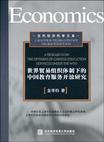世界贸易组织体制下的中国教育服务开放研究
2009-6
对外经济贸易大学出版社
金孝柏
431
519000
教育服务是世界贸易组织(WTO)体系中服务贸易的一个重要部门,我国在“入世”协议中承诺开放教育服务,并在此后的开放实践中渐进改善教育服务立法。另一方面,教育在我国是一个热点话题,教育学、经济学和管理学等诸多领域的学者从不同角度对我国的教育进行了较多的研究。 教育与教育服务之间的界限并不明显,尤其是我国的学者很少使用教育服务的提法,这与长期以来我国对教育的法律定位有关。“入世”以后,一些法学学者试图从行政法和国际法的角度(主要以WTO为背景)研究我国的教育问题,但几乎没有人把教育服务作为我国开放的服务部门整体地置于WTO的法律背景下进行考察与研究。本书是从法律角度研究我国教育服务开放机制与法制的尝试。 由于长期从事教育工作,我对教育与法制的关注较多。从2000年起,我开始关注WTO体制下各国教育服务政策与法制的走向与发展,同时对我国教育服务中存在的问题进行研究。结果发现,我国教育问题的根源在于对教育服务的模糊定位,从而导致政府功能在教育服务提供中的缺位、越位与错位,也导致了教育服务开放中产生的一系列问题,其中,最突出、最根本的问题就是教育法制滞后、教育体制残缺。因此,要根本解决我国在开放教育服务中的问题也必须从改革体制、健全法制开始。 本书从分析教育服务的基本属性入手,将教育服务的属性与应然定位紧密联系,指出我国教育的法律定位与现实发展的矛盾是导致教育服务提供过程中种种乱相的根本原因,进而影响了我国教育服务开放的整体规划与布局。
《世界贸易组织体制下的中国教育服务开放研究》从分析教育的性质入手,研究教育的功能和政府在提供教育服务方面的责任和义务,分析教育产业化的必要性和可能性。教育的产业化并不减少或削弱政府的教育职责;相反,教育的产业化要求加强政府的教育职责,它只是为政府实现教育目标提供了新的选择。教育的经济属性使得教育服务可以跨境提供,实现部分教育部门(主要是高等教育服务)的国际化。开放教育服务是我国加入世界贸易组织(WTO)的庄严承诺。但是,我国学者很少研究“入世”以后教育服务开放面临的法律环境。国内教育立法的不完善与开放教育服务过程中出现的种种问题对我国履行“人世”承诺产生较大的影响。因此,从法律角度研究WTO体制下的中国教育服务开放政策具有理论和现实意义。《世界贸易组织体制下的中国教育服务开放研究》认为,教育在本质上是一种服务,属于准公共产品,具有政治、经济、文化和社会功能。国内的学术界、教育界、政府部门片面强调教育的政治、文化和社会属性,对教育的经济属性认识不足。学术界和普通民众对教育产业属性的认识甚至发生偏差,简单地把教育高收费和乱收费等同于教育产业化。 国家拥有教育主权,公民享有平等的受教育权。教育主权的内涵包括国家在教育领域享有对内的立法权、管理权、司法权和发展权以及对外的开放权。保障公民的受教育权的完整实现必然要求国家为公民提供充分平等的教育机会,国家有义务为公民提供基本的教育。国家行使教育主权和保障公民受教育权的完整实现,这为国家开放本国的教育市场提供了可能性和可行性。
金孝柏,男,生于江苏灌南,法学博士,注册律师,任职于上海对外贸易学院国际经济贸易研究所,专职从事世界贸易组织法和国际经济法研究,先后发表过近20篇专业论文,主编法律英语教材一部,参与过两个省内研究项目。
AbstractChapter 1 General Introduction 1.1 Research Orientation 1.2 Research Objectives 1.3 Research Questions 1.4 Significance of the Research 1.5 Rationale of the Research 1.6 Research Methodologies 1.7 Terms and Definitions 1.8 The Organization of This Book Chapter 2 Literature Review 2.1 The Nature of Education 2.2 The Functions of Education 2.3 The Government's Role in Supply of Education 2.4 The Commercialization of Education 2.5 Transnational Trade in Education Services 2.6 Internationalization of Higher Education Services 2.7 SummaryChapter 3 Education Services in General 3.1 Education Services in General 3.2 The Functions of Education 3.3 The Nature of Education : Quasi-Public Goods 3.4 The Government's Role in Supply of Education 3.5 The Commercialization of Education 3.6 National and Transnational Supply of Education 3.7 Issues Concerning the Supply of Education Services 3.8 SummaryChapter 4 The Development of Education Policy and Law in China 4.1 The Development of Education Policy in China 4.2 Legislation on Education in China 4.3 Issues Regarding Chinese Legislation on Education 4.4 The Commercialization of Education in China 4.5 Problems with the Chinese Education System 4.6 China Needs to Segment For-profit Education from Non-profit Education 4.7 SummaryChapter 5 Cultural Protectionism and Education Services 5.1 The Definition and the Nature of Culture 5.2 Culture in the GATS 5.3 Globalization and Cultural Protectionism 5.4 Cultural Protectionism and Education Services 5.5 SummaryChapter 6 The WTO Provisions Relating to Education Services 6.1 GATS and Education Services 6.2 Modes of Supply of Education Services in the WTO 6.3 Excessive Opening, Emergency Safeguards and Subsidies 6.4 Effect of Transnational Education Services 6.5 Recognition and Accreditation of Qualifications 6.6 Assurance and Assessment of Education Quality 6.7 SummaryChapter 7 Opening Education Services under the WTO:An Examination of Policies in Seven Countries 7.1 General Introduction 7.2 Education Opening Policy in the United States 7.3 Education Opening Policy in France 7.4 Education Opening Policy in Korea 7.5 Education Opening Policy in Japan 7.6 Education Opening Policy in India 7.7 Education Opening Policy in Australia 7.8 Education Opening Policy in Poland 7.9 SummaryChapter 8 Opening China's Trade in Services:Commitments, Implementation and Problems Chapter 9 Opening Chinese Education Services under the WTO: Commitments and Implementation Chapter 10 Opening Chinese Education Services under the WTO: Problems, Challenges and Future StrategiesChapter 11 ConclusionBibliographyAppendix Selected WTO Members' Specific Commitments in the Education SectorAcknowledgements
1.4.1 Academic Significance of the Research The education sector is showing a strong tendency to opening and reform in theworld today, partly as a result of economic globalization and regional integration. It isincluded in the WTO system as a tradable service sector and has become a major focusof negotiations on trade in services. In China, there are numerous scholars engaged inthe research on the education sector from the perspectives of education managementand economics, but few people have done research from the perspective of legislationin the context of Chinas accession to the WTO. Fewer focus their attention on theopening of Chinese education and the formulation and legalization of Chineseeducation policies. Most of the current publications on trade in services in China alsoavoid touching upon education services. It must be admitted that the research on theeducation services in China still has a long way to go before researchers engaged inlaw studies shift their attention to the probe into the development and the opening ofeducation services in the new legal environment at both national and internationallevels for solutions to the problems with the current Chinese education sector. This research is first of all an academic scheme intended to fill in the blank ofacademic research in China today as is mentioned above. Since China has committeditself to opening its education sector and implementing the WTO rules, its accessioncommitments require more academic research on education services from allperspectives for countermeasures that China can adopt to meet the challenges incurredby the new development of education services. The lack of studies on the Chineseeducation sector from the perspective of legislation should be ended for the sake ofdeveloping and opening Chinese education services in the long run.
